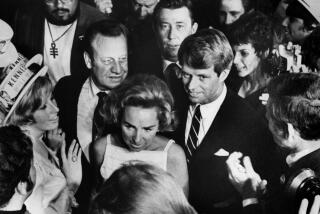The Senate’s enduring Lion
Sen. Edward M. Kennedy (D-Mass.) has become such a perpetual figure in American politics that it’s easy to think of him as more memorial than man, one of the capital’s landmarks -- the Mall, the Smithsonian, the White House and Teddy Kennedy in the Senate.
It is difficult to tell his life story without almost immediately running into a similar problem. Flash a few photographs of Kennedy’s youth -- all those hale and hearty boys, and girls, playing football on the lawn, those family portraits ablaze with that famous smile -- and biography quickly vanishes into mythology. Kennedy’s own life has been long and complicated enough to defy any easy telling, but weighted with the assassinations of brothers John and Robert, Teddy may be the K2 of biography.
Produced by Peter Kunhardt and Sheila Nevins, HBO’s “Teddy: In His Own Words” is much more tribute than analysis, the sort of film that frankly most often shows up posthumously. (Kunhardt produced similarly named documentaries on Jack and Bobby Kennedy.) The “Own Words” are pulled from various interviews and speeches rather than any looking-back-type interview.
At its best, it serves as a reminder of just how long the man now called the Lion of the Senate has been involved in American politics, just how many tragedies and setbacks (some of his own making) he has endured and how consistent he has been in his political message.
Kennedy entered politics as a card-carrying liberal Democrat, fought tirelessly for civil rights and women’s rights and remains a champion of liberal goals.
At its worst, the film can be blindly sentimental. Kennedy is portrayed as a man driven by devotion to service; base catalysts like personal or political ambition simply don’t come up. Although the drowning of Mary Jo Kopechne in Chappaquiddick is discussed, it is far more quickly dismissed by the film than it has been by many Americans.
Still, for all the epic familiarity of Kennedy’s story, there are surprises and important reminders -- Kennedy’s campaigning for reelection from the hospital after a plane crash almost left him paralyzed; President Nixon’s attempts to bring him down -- in one chilling conversation, Nixon says he doesn’t care if this Kennedy gets shot too.)
Behind all his Irish charm, there is also a refreshing New England stoicism to Kennedy. In some ways, he is the ultimate example of a man surviving the greatness that has been thrust upon him.
Perhaps the most poignant moment in the film comes during a “60 Minutes II” interview when he is read a note Jacqueline Kennedy Onassis wrote to him after he gave her daughter, Caroline, away at her wedding: “On you the carefree youngest brother fell a burden, a hero would have begged to be spared. We are all going to make it because you were always there with your love.” Nodding, perhaps a little teary-eyed, Kennedy replies, “That’s about as nice as you can get.”
Kennedy, like his brothers before him, remains a polarizing figure, and “Teddy in His Own Words” is a film that fans of the senator and his family will enjoy far more than detractors.
But if you forget about the personalities and power plays, if you bypass the swamps of nostalgia and shadow of Camelot, there is a lesson of simple endurance here that, like the stalwart image of the Washington Monument or the hush that falls on visitors stepping into the cool shade of the Lincoln Memorial, is impossible to ignore.
--
--
‘Teddy: In His Own Words’
Where: HBO
When: 9 tonight
Price: TV-PG (may be unsuitable for young children)
More to Read
Only good movies
Get the Indie Focus newsletter, Mark Olsen's weekly guide to the world of cinema.
You may occasionally receive promotional content from the Los Angeles Times.











